Popular Reads
Top Results
Can't find what you're looking for?
View all search resultsPopular Reads
Top Results
Can't find what you're looking for?
View all search resultsAI and AR create extra personal customer interactions
This level of personalization doesn’t just enhance the shopping experience—it also drives customer loyalty, which is increasingly in short supply.
Change text size
Gift Premium Articles
to Anyone
I
ndonesia's retail industry has long been an important contributor to the country's economy, but, like many around the world, the sector’s growth and resilience are being challenged by inflation, economic uncertainty, and cautious consumer spending.
However, these challenges can also represent fresh opportunities for brands and retailers to reinvent themselves and cater to the evolving needs of the modern consumer.
In recent years, consumer behaviors have shifted further toward convenient, personalized, and omnichannel shopping experiences. Consumers are no longer satisfied with traditional shopping methods; they demand wider availability, both online and offline, and expect their shopping journeys to be tailored to their individual preferences.
To thrive in this evolving retail landscape, retailers and brands must embrace innovation as the key to staying ahead of the competition. Harnessing the power of technology, specifically artificial intelligence (AI) and augmented reality (AR), is essential for creating personalized, engaging experiences for customers. AI and AR can be the right tools to help Indonesian retailers transform their business, gain a competitive edge, and meet their customers exactly where they are.
Today’s consumers want to feel heard, valued, and understood by the brands they choose to engage with. This shift toward personalization is expected to play a significant role in the future of retail, and AI and AR technologies are poised to support this transformation. In fact, the use of AI in retail is expected to grow by over 30 percent annually over the next five years, according to Mordor Intelligence.
Personalization is not just about addressing customers by their first names; it's about tailoring every aspect of the shopping journey to their preferences. AI-powered algorithms can help with this by analyzing vast amounts of data to understand individual preferences, purchase history, and browsing habits, enabling retailers to provide product recommendations and promotions that resonate with each customer. This level of personalization doesn’t just enhance the shopping experience—it also drives customer loyalty, which is increasingly in short supply.
Furthermore, an omnichannel approach to retail is becoming increasingly essential, as customers now expect to seamlessly switch between online and offline channels. AI can help retailers target the clientele to deliver this experience accurately, while AR can bridge the gap between digital and physical stores by offering cutting-edge and immersive virtual try-on solutions.
Beyond customer experience, advanced AI in retail can also improve overall business operations, making inventory management, supply chain management, and forecasting more efficient and accurate.
To better understand how AI and AR can help enhance customer experiences, let’s explore a few use cases.
For instance, there is a growing interest in health and wellness among Indonesian consumers, and skincare has become a vital aspect of people’s overall wellness routines worldwide, leading them to seek ways to understand their skin better and identify products that offer them the most benefits. This is where solutions like AI skin analyzers thrive. These tools evaluate a consumer's skin and provide tailored skincare advice and product recommendations based on analysis of their skin type, condition, and needs.
Another remarkable solution is virtual try-on, which has found success in the beauty and fashion industries. Several makeup and clothing brands now employ this technology to enrich the online shopping experience and reduce the likelihood of returns. It uses phone camera filters to let customers visualize how products like lipsticks, foundations, and clothes will look on them, ultimately boosting consumer confidence, fostering deeper brand connections, and increasing conversion rates.
AI and AR technology have brought transformative impact to the customer experience. In response to the evolving consumer demands during COVID-19, brands adapted by integrating virtual makeup try-on and foundation shade matching into their website. This move empowered customers to make informed purchases from their homes, enhancing their online shopping experience and driving increased website traffic.
The challenges facing the retail industry are real, but they are also opportunities for growth and innovation—just as they were during the pandemic. As the retail sector in Indonesia continues to evolve and competition intensifies, retailers and brands can take a step forward by considering embracing AI and AR to help them establish more personal connections with their customers and thereby provide the personalized, multichannel experiences that today's consumers demand.
***
The writer is CEO and founder of Perfect Corp.











